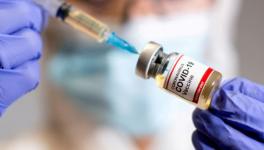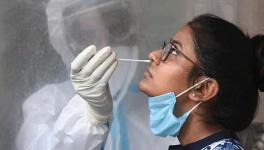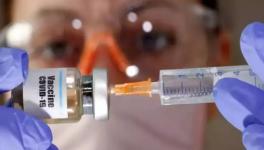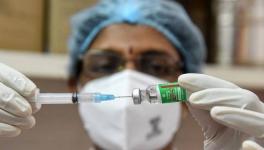COVID-19: As New Virus Strains Spread, Study Examines Vaccine Efficacy; in UK Severe Patients to Get Arthritis Drugs
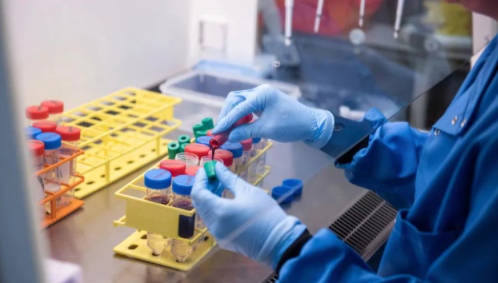
Representational Image. Image Courtesy: AP
New challenges that are emerging in the pandemic, either in disease complexities or the novel coronavirus, have engaged scientists in an unceasing effort to mitigate the problems. The recent challenge has emerged in the form of viral mutations that have given rise to new strains that can spread more easily and also raised concerns about whether the available vaccines would be effective. All mutations, the changes in the genetic architecture of the virus, are not meaningful, but some of them can impact the virus either positively or negatively. Few interesting findings in this regard have come out, but of course with caveats.
CAN PFIZER VACCINE PROTECT AGAINST NEW STRAINS?
Two strains, namely the B1.1.7 and the 501.V2, prevalent in the United Kingdom and South Africa respectively, are under the lens primarily due to their ability to spread at a higher rate. Looking at whether the currently available vaccines are effective against these variants, one study has claimed that the Pfizer and BioNTech vaccine is effective. The study looked into the neutralising antibodies, which prevent the virus from entering a human cell. The study reported that this kind of antibodies, produced by those vaccinated with the Pfizer vaccine, do not alter their activities in case of infection by the new strains.
The claims of the study, however, come with several caveats. The first point is that the study signifies only some initial results. It was conducted on a specific mutation on the spike protein, called N501Y, which is present in both the strains, whereas, it did not include all the mutations of the spike proteins of the strains. This point has also been raised by the authors of the study.
Through the spike protein, the virus binds itself to a host cell and opens up its way to enter into the cell. the N501Y mutation is present on the portion of the protein that binds to the cell and hence, it’s thought to be a crucial one.
Moreover, the study, conducted jointly by scientists of Texas University and Pfizer, included only 20 participants who were vaccinated with the Pfizer vaccine.
The team, however is reported to be conducting studies on other mutations and its effects on the vaccine.
ARTHRITIS DRUGS TO TREAT SEVERE COVID-19 PATIENTS
Two drugs that are used in the treatment of rheumatoid arthritis, could be helpful in treating severe COVID-19 patients. A clinical trial result has reported that the two drugs can save lives
of one out of every 12 patients under intensive care.
The two drugs are tocilizumab and sarilumab. The NHS (National Health Service) of UK is going to use tocilizumab to treat severe COVID-19 patients from this week, health officials said. This was done when a clinical trial showed that treatment with tocilizumab was found to be beneficial in 800 patients it decreased the risk of death by 24%.
The other drug sarilumab was found to be having a similar effect, saving lives of patients under intensive care.
These results came out of a clinical trial known as Remap-Cap (The randomized embedded multifactorial adaptive platform for community-acquired pneumonia). This trial contains 3,900 COVID-19 patients in 15 countries. However, the results have not yet been peer reviewed.
The clinical trial randomised patients who were administered standard treatment and intravenous infusion of tocilizumab or sarilumab within 24 hours of them being put on organ support in an intensive care unit. The researchers monitored their health conditions for 21 days. The trial consisted of 800 patients belonging to six different countries.
Professor Peter Horby of Oxford University, who is leading the ‘Recovery Trial’ project (to assess drugs for the treatment of COVID19 patients) but is not involved in the Remap-Cap study, said that the results were encouraging.
Both these drugs are known to suppress inflammation due to overreacting immune system, which is one of the foremost reasons of COVID-19-related complicacies.
NEW STRAINS CONTINUE TO SPREAD
The new strains, which emerged in the UK and South Africa, have continued their spread. More than 30 countries have reported the presence of the variants in fresh outbreaks. India has also seen an increase in cases of infection by the variant that emerged in the UK; as per latest reports, the number has risen to 96 now.
Further, Japan’s National Institute of Infectious Disease (NIID) said that it has found a new strain, which has similarities to the other new strains. In a statement, the Ministry of Health in Japan said that the new strain could have come along four passengers that arrived in the country from Brazil. The NIID has also apprised the WHO about the new strain.
The NIID said that the new strain shares some mutations that have already been found in the other two strains. These mutations are concerned with the high infectivity of the strains.
However, at this time, any information regarding the new strain in limited to its genetic make-up only. Nothing could be said about its contagiousness and the risk of severity associated with it, etc.
Get the latest reports & analysis with people's perspective on Protests, movements & deep analytical videos, discussions of the current affairs in your Telegram app. Subscribe to NewsClick's Telegram channel & get Real-Time updates on stories, as they get published on our website.












